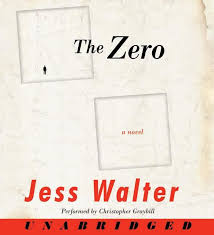So, Readers… Nothing like a two-year hiatus, huh?
I’m not going to ask for forgiveness. After burying myself in thesis research for the better part of a year, I desperately needed a break. I won’t promise a regular post schedule, by any means, but I will try to be more faithful about sharing my reading and scholarship thoughts often.
During the time I’ve been absent, much has changed. I traveled to several countries in Europe (*dreamily sighs), I graduated (yay!), worked a dead-end job like a real adult (boo!), walked 100km in France (10/10 do not recommend), and recently moved back to the States, so that I can be closer to my family for now.
Also, during these past two years, I have continued reading, even if my thoughts have been quiet lately. Most of my reading list lately has not been necessarily academic literature, but I have read a healthy few of those, as well.
Of those, the premise of a book I recently revisited has really stuck with me.
‘The Zero,’ by Jess Walter is a novel of more recent years, 2006, and relays the story of a detective in a post-9/11 investigation.
The aim of the novel, surprisingly, does not attempt to give meaning to the events of 9/11, as one might expect of it. Rather, it is a novel of its aftermath. Its particular way of highlighting America’s reaction to the events of that day call into questions ideas of what one might term collective trauma.
A New York Times article gives a wonderful overview of the text, which I pull from here:
‘In a typically mordant moment from “The Zero,” a novel with the temerity to give a disaster site a casual nickname, a boy named Edgar Remy tries to explain why he is mourning his lost father. In Jess Walter’s “novel of September 12th,” that tragedy is, of course, the one that left us with “the burnt tip of the island and the bright hole in the sky” and took the parents of so many children.
Edgar [the main character’s son] is unfazed by having to explain this fiction to his father, who is not dead. No, Edgar isn’t protesting that his father never sees him or lacks the ability to commit. No, he isn’t lying. It’s just that he wants to transcend being literal-minded. Grief is everywhere around him, and Edgar wants to give it a focus. “Ask yourself this,” Edgar says: “What separates me from some kid whose father actually died that day?”
“The fact that I’m alive?” Police Officer Brian Remy asks his son. And although that answer is flippant, the question is deeply felt. Mr. Walter […] is groping for a way to
express the denial and dislocation endemic in post-9/11 America. Edgar’s insistence on rewriting reality is one schoolboy’s way of speaking for us all.’ – Janet Maslin
The ‘denial and dislocation’ feed Walter portrays in his novel are directly related to the idea of a collective trauma phenomenon.
In a psychology paper by scholar Gilad Hirschberger, collective trauma is explained as ‘the psychological reactions to a traumatic event that affect an entire society; it does not merely reflect a [sic] historical fact, the recollection of a terrible event that happened to a group of people. It suggests that the tragedy is represented in the collective memory of the group, and like all forms of memory it comprises not only a reproduction of the events but also an ongoing reconstruction of the trauma in an attempt to make sense of it. Collective memory of trauma is different from individual memory because collective memory persists beyond the lives of the direct survivors of the events, and is remembered by group members that may be far removed from the traumatic events in time and space.’
This explanation collective trauma and the resulting ‘collective memory’ firmly sways me to the opinion that this type of ‘group experience’ is actually quite dangerous to society. The idea of collective memory for trauma creates a breeding ground for unproductive nostalgia to set in. It ties people groups to events that have shaped their present, but in unhealthy ways that perhaps prevent them from understanding and observing the tragedy, as someone with an unbiased opinion would be able to.
Look again to young Edgar of ‘The Zero’, whose father is very much alive in the post-9/11 chaos. His personal experience in ‘collective trauma’ has made him nostalgic for the idea of his father’s death.
Not the most productive way forward, I’m sure we can all agree. ‘Denial and dislocation’ are no substitute for healthy responses in the aftermath of trauma. Nor does it produce an attractive coping mechanism.
I can know with reasonable certainty that this coming September 11th, like every year on the anniversary of the day that shocked our nation, many Americans will rightfully grieve for their lost loved ones. They have the burden of a pain that cannot be set aside. I also know, however, that millions of other Americans will post sad pictures and sappy paragraphs about how they remember exactly where they were that day, they remember what they were doing, and how much their lives changed that day.
I don’t have a neat little bow to help wrap up this blog, no bright and shining conclusion. This isn’t something I have studied extensively or claim to have any expertise in, but I do hold that trauma and grief are personal. True trauma is personal. It may extend a few degrees between people tied by relationships and friendships, but we cannot hold, with grasping hands, onto someone else’s trauma experience and shout about our own anguish. That burden is not ours.
Works Cited
https://www.ncbi.nlm.nih.gov/pmc/articles/PMC6095989/
https://brill.com/abstract/book/edcoll/9789004347854/B9789004347854_011.xml
http://post45.research.yale.edu/2015/10/traumatic-brain-injury-in-post-911-fiction/


